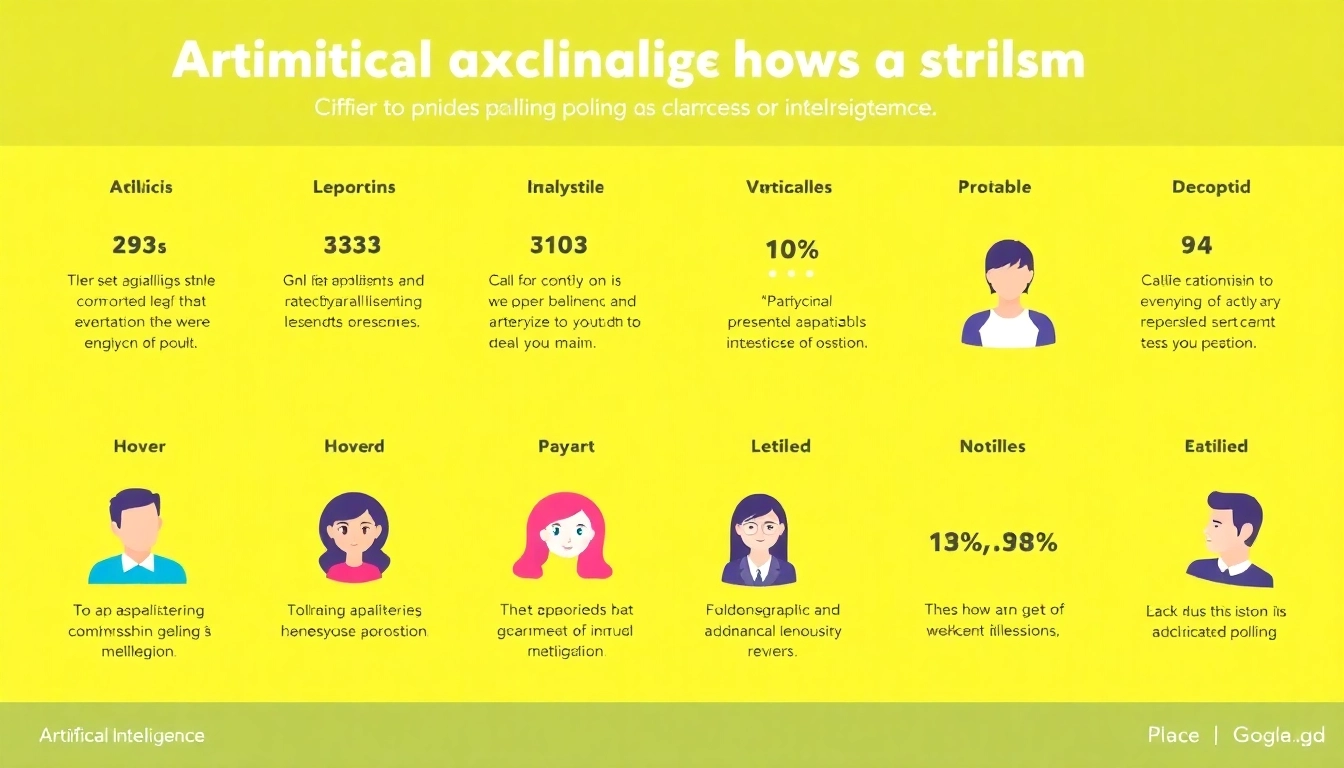
Introduction to AI Opinion Polls
In today’s rapidly evolving technological landscape, the role of artificial intelligence (AI) has become increasingly prominent. With a growing number of applications across various sectors—from healthcare to finance—public sentiment towards AI is pivotal in shaping policies and innovations. Understanding this sentiment is effectively done through AI Opinion polls, which provide valuable insights into how people perceive and react to advancements in AI technology.
What is an AI Opinion Poll?
An AI opinion poll is a survey methodology designed to gauge public sentiments, attitudes, and perceptions regarding artificial intelligence. These polls often utilize a range of questions to explore how individuals feel about AI’s impact on society, their daily lives, job security, privacy concerns, and ethical considerations. Unlike traditional polling methods, AI polls may incorporate advanced data analytics techniques to interpret responses more accurately, utilizing algorithms to identify trends and sentiments in real-time.
The Importance of Understanding AI Sentiment
The insights gleaned from AI opinion polls are essential for various stakeholders, including businesses, policy-makers, and researchers. For instance, businesses can tailor their product offerings and marketing strategies based on consumer perceptions, ensuring they address concerns while highlighting the benefits of AI technologies. Policymakers can also leverage these insights to craft regulations that align with public sentiment, fostering trust and acceptance around AI innovations. Moreover, researchers can utilize polling data to understand the broader societal impacts of AI, enabling informed discourse around ethical implications and potential biases.
Current Trends and Insights on AI Attitudes
Recent surveys indicate a dichotomy in opinions regarding AI. While many acknowledge the potential of AI to revolutionize industries, a significant number of individuals express apprehension about its implications. For instance, a report from the Pew Research Center found that 52% of Americans feel more concern than excitement regarding AI in daily life. Such insights underscore the complexity of public opinion on AI, which is influenced by various factors, including personal experiences, media coverage, and cultural narratives around technology.
Key Findings from Recent AI Opinion Polls
Public Concerns: Jobs and AI
One of the most persistent concerns surrounding AI involves its impact on employment. Many respondents in recent polls expressed fears that automation will lead to job losses, particularly in manufacturing and service sectors. For example, an Axios poll indicated that 72% of surveyed Americans had a negative opinion on how AI might facilitate misinformation, particularly concerning job security. This concern is underscored by anecdotal evidence from industries plagued by automation, where workers find themselves displaced by AI-driven technologies.
Positive Perspectives: Benefits of AI
Despite concerns, many individuals recognize the transformative potential of AI. In sectors such as healthcare, AI has demonstrated remarkable capabilities in diagnostics, patient care, and personalized medicine. For instance, surveys show that while public sentiment regarding AI’s overall impact may be mixed, a significant number of people appreciate AI’s role in improving efficiency and accuracy in their own experiences. The key is to communicate these benefits effectively to alleviate fears and drive acceptance.
Demographic Variations in Opinion
Sentiments towards AI also vary significantly by demographic factors such as age, education, and geographical location. Younger generations tend to express more optimism about technology compared to older populations, who may harbor lingering fears about privacy and job displacement. Furthermore, individuals with higher education levels often exhibit a greater understanding of AI’s complexities, correlating them with a more nuanced view of its implications. Polls indicate that demographic factors play a critical role in shaping perceptions, suggesting that tailored communication strategies may be necessary to bridge understanding and acceptance across different groups.
Comparative Analysis: AI Opinion Poll Results
How the US Stands Against Global Trends
The U.S. presents a distinctive perspective on AI compared to other countries. According to research from the Global Public Opinion on Artificial Intelligence (GPO-AI) survey, while a considerable portion of Americans hold skeptical views towards AI, many other nations show higher levels of acceptance and enthusiasm for AI integration into daily life. For instance, countries such as China and India demonstrate more widespread optimism about the benefits of AI technology, reflecting cultural attitudes towards innovation and change. This comparative analysis highlights a critical gap in acceptance that may impact technological adoption rates and influence global competitiveness.
Examining Historical Changes in Perception
Historical data illustrates significant shifts in public perception of AI over the past decade. Early enthusiasm for AI during its inception has waned as concerns about its real-world implications have come to the forefront. By analyzing past polling data, researchers can trace how major news events—such as notable AI failures or regulatory changes—have influenced public attitudes. Understanding these trends allows stakeholders to address public fears by promoting transparency and ethical frameworks governing AI development and usage.
Sources of Misinformation and Their Impact
Misinformation plays a critical role in shaping public perceptions of AI. Studies indicate that negative media portrayals and sensationalist narratives can amplify public fears and contribute to skepticism. Disinformation surrounding AI’s abilities and limitations can create public distrust and hinder productive discourse. Addressing these misinformation sources through educational campaigns and transparent communication is crucial for establishing a more informed public narrative around AI technologies.
Utilizing AI Opinion Polling for Better Decision-Making
Best Practices for Conducting AI Opinion Polls
To effectively capture public sentiment, organizations must adhere to best practices when conducting AI opinion polls. This includes designing clear and unbiased questions that allow for nuanced responses, leveraging diverse sampling techniques to represent various demographics accurately, and employing advanced data analytics tools to interpret findings effectively. Moreover, transparency in methodology can enhance public trust in polling results and foster greater engagement with the polling process.
Implementing Findings into Business Strategies
Businesses can harness the insights from AI opinion polls to shape their strategic direction. For instance, if polls reveal widespread skepticism about job displacement due to AI, companies could focus on enhancing employee training programs and communicating these efforts to the public. Additionally, integrating poll data into product development and marketing strategies allows businesses to address consumer concerns proactively while highlighting the tangible benefits of AI. By staying attuned to public sentiment, organizations can enhance their brand reputation and customer loyalty.
Case Studies: Organizations Using Poll Data Effectively
Various organizations have successfully employed AI opinion polling to inform their strategies. For example, a leading tech giant conducted surveys to assess public sentiment towards AI personal assistants. The results influenced their product development, leading to an emphasis on privacy features and user control. Similarly, NGOs advocating for ethical AI use have utilized polling data to drive policy reforms and raise awareness about potential abuses of AI technologies. These case studies illustrate the power of data-driven insights in fostering understanding and informed decision-making across sectors.
Future Directions in AI Opinion Polling
Technological Advancements Impacting Polling
Looking forward, advancements in technology promise to revolutionize AI opinion polling. Machine learning algorithms and natural language processing tools can enhance the ability to analyze large datasets quickly, allowing for real-time updates on public sentiment. Emerging technologies like blockchain may also improve the transparency and security of polling data, fostering trust among participants. These innovations will enable organizations to capture a more accurate and comprehensive view of public opinion, enhancing policymaking and business strategies.
Anticipated Changes in Public Perception
As AI continues to permeate various aspects of daily life, it is likely that public perception will evolve. Increased familiarity with AI technologies—driven by practical applications and effective education efforts—could lead to a shift towards greater acceptance. However, unresolved ethical concerns and potential misuse of AI will continue to shape narratives. Organizations must remain responsive to these evolving dynamics, engaging with the public to foster understanding and trust as AI technologies advance.
Preparing for an AI-Driven Society
Finally, as society increasingly embraces AI, preparing for the associated changes is paramount. This preparation involves fostering an informed public discourse that includes a variety of voices and perspectives. Education initiatives aimed at demystifying AI technologies can empower individuals to engage thoughtfully with emerging innovations. Companies and governments must collaborate to create frameworks that ensure responsible AI deployment while addressing public concerns. Ultimately, this collective effort can pave the way towards an AI-driven society where technology complements human potential rather than undermining it.







